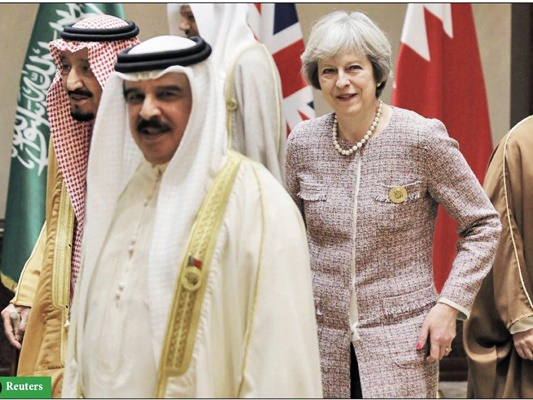In a Farsi interview with Etemad daily, Tafreshi discussed Britain’s presence in the Middle East and its relations with Iran and the Arab world.
Here are excerpts from his interview:
- Persian Gulf Cooperation Council [P](GCC) owes its establishment to the victory of the Islamic Revolution of Iran.
- Following three consecutive meetings of Queen Elizabeth, Prime Minister Margaret Hilda Thatcher and senior aid of the then Prime Minister Sir Anthony Derrick Parsons, who was the last ambassador of the UK after Iran’s 1979 Revolution, the Persian Gulf Cooperation Council was formed without partnership of Iran and Iraq and on advice and support of Britain.
- Britain wants to ensure its ceaseless and official military re-appearance in the Persian Gulf.
- Two events, namely Brexit and the election of Donald Trump as the US President, have made the presence of Britons in the region and expansion of their relations with Arab states more necessary than ever.
- Arabs want to rest assured that, apart from the US and the EU, they will have strong Western supporters and partners.
- All the Persian Gulf littoral states have somehow various military cooperation with Britain. Of course, the level of London’s cooperation with all of them is not equal.
- One of the hard-headed opponents of Britain’s good relations with the Persian Gulf southern littoral states is the leader of Britain’s opposition Labour Party Jeremy Corbyn. Either before taking the post or now, he has both independently or as the head of the “Stop-the-War Coalition” opposed selling arms to the countries. It seems that he and other opposition groups under present conditions will add up to their activities in this concern.
- Britain has made its mind to expand its markets in Arab countries. The slogans recently uttered by Theresa May are mostly a cover to attain the objective.
- Other EU states also cannot assume the role due to the human rights restrictions for cooperation with Bahrain and Saudi Arabia.
- Britain stands as second homeland for the Persian Gulf Arab states, and even the formation of these countries, ranging from Saudi Arabia to Qatar, Bahrain and the UAE, was the outcome of London’s policies.
- The contradictory statements recently made by Theresa May and Boris Johnson should be looked at from two perspectives: The first outlook is that the statements of Johnson were his personal opinions and were made without coordination with the Prime Minister. The claims are personal and in my opinion they are awkward. The second perspective is that Britain is following up the carrot and stick policy in connection with Arabs.
- London does not wish to overlook Iran’s market. It has spent much time on presence in the market. Now they are determined to make investment in Iran. However, one should admit that Britain’s relations with the Persian Gulf Arab states is more age-old and more extensive.
